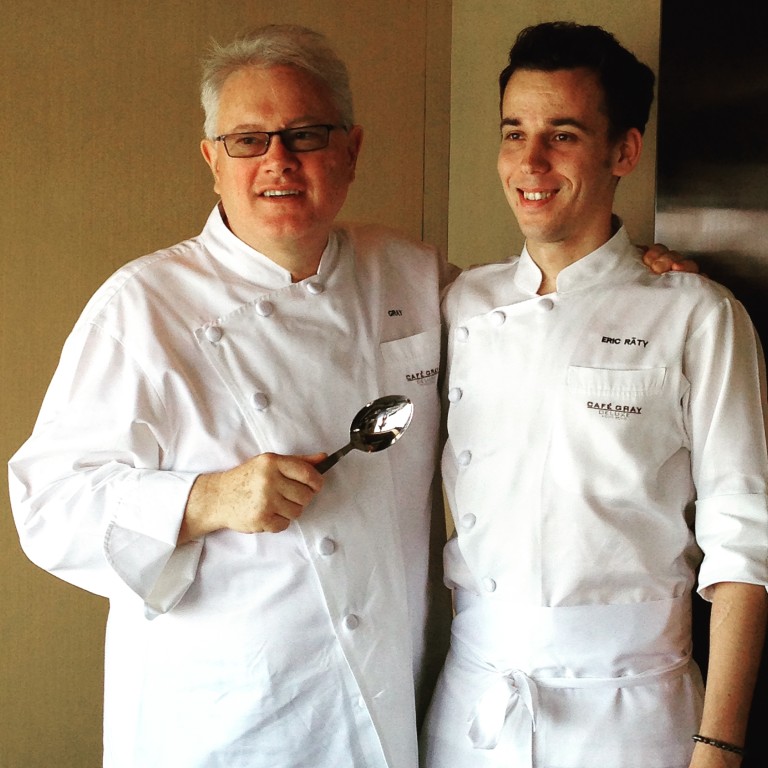
'He opened my eyes': Café Gray Deluxe chef Gray Kunz, who has died aged 65, recalled by a former protege, Michelin-starred Eric Raty of Arbor
'He didn't want to wait until next week to fix something - it had to be done right away, Arbor chef Eric Raty says of Swiss colleague who opened Cafe Gray Deluxe 10 years ago after a distinguished career in Hong Kong and New York.
The Singapore-born Kunz spoke to Bernice Chan In a 2017 Post Magazine interview
Chef Gray Kunz, who founded Cafe Gray Deluxe in The Upper House in Hong Kong over 10 years ago, has passed away. He was 65 years old.
While his culinary career flourished in the 1990s in New York at Lespinasse, before that he made a name for himself at Plume, the fine-dining French restaurant at The Regent Hong Kong (now InterContinental Hong Kong) hotel.
His death, after suffering a stroke, was announced on The Upper House website and social media accounts. The statement read in part: "More than 10 years of collaboration on Cafe Gray Deluxe in Hong Kong, and later in Shanghai, further strengthened both our friendship and respect. Gray was an integral part of the success not only of The Upper House and The Middle House, but of Swire Hotels as a whole."
One of his proteges is Eric Raty (pictured below, at Cafe Gray Deluxe), whose restaurant Arbor was awarded two Michelin stars last December, and attributes his culinary success to Kunz.
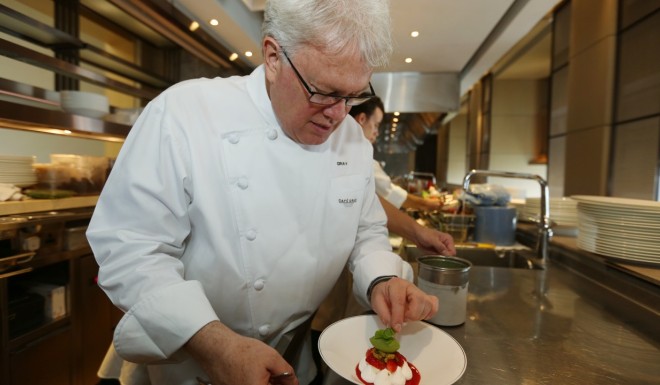
Raty worked under Gray for almost three years and says his mentor was an amazing man who was much more than a chef.
“He was the third chef I was under and I learned more from him than just cooking. He opened my eyes,” Raty says. “He taught me to not just look at the plate, but around the plate, the kitchen, the team.”
Gray Kunz: passionate chef who embraced Asian flavours
Raty last saw the Swiss chef a week before Christmas in Hong Kong and says Kunz was still very active, telling him about his various projects in Singapore and Shanghai, and the importance of using sustainable fish, one of his pet projects.
One of many things that Raty learned from Kunz is to constantly improve in all aspects of the restaurant. “He didn’t want to wait until tomorrow or next week to fix something - it had to be done right away. And now in my restaurant I am trying to refine things all the time.”
Kunz talked to Bernice Chan in 2017 about his early life in Asia, his career in Hong Kong and some of his favourite places in the city.
How is it that you came to be born in Singapore? “When my dad was in his late 20s, he moved to Surabaya, Indonesia [from Switzerland], working as a coppersmith in mines. When the second world war broke out, he was deported to Singapore, where he met my mum, a nurse from Ireland. Three of us boys were born there. I was the middle child.”
What was your childhood like? “I was in Singapore until I was 11 [when the family moved back Switzerland] and had an incredible childhood. My first language was Malay. I remember the food stalls and the fruits. My dad lived there for over 40 years. He always went to the same hawker stand and his noodles would be there when he arrived. We did a lot of swimming, sports, and, of course, I remember the heat.”
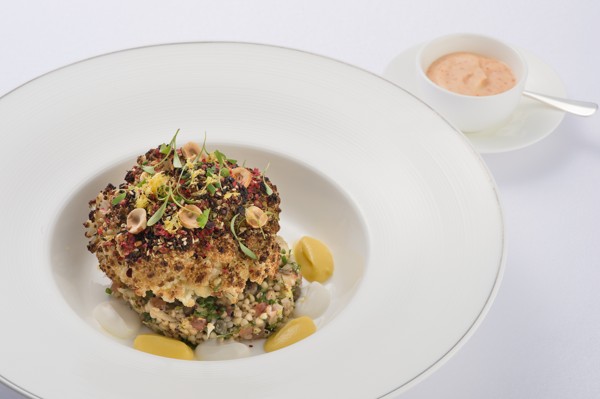
What was it that attracted you to cooking? “It’s inspiring to me. It’s working with the seasons, with people who are very talented. It keeps my mind sharp, because it’s physically very demanding. But I am now able to step back and hand over important tasks to key people and they execute them well, sometimes better than me. My role now is more of a mentor and teacher.”
Plume was an amazing place and it was the turning point for me ... One morning I decided either I stay in Hong Kong or go back home
Tell us about your time at Plume restaurant, at The Regent hotel in Tsim Sha Tsui, in the 1980s. “Plume was an amazing place and it was the turning point for me. I went there initially yelling in the kitchen, demanding, not giving proper feedback – which goes back to my experience with Girardet. One morning I decided either I stay in Hong Kong or go back home.
“I made the choice to stay. This is part of my life; I was born in Asia. Don’t make mistakes like other chefs when they go abroad. So one morning I sat there and watched the guys [in the kitchen]. They had this crummy pot that looked like it was from the Sham Shui Po market. They put it on the stove, when it was boiling they put in two handfuls of tea. That was their drink all day long. So, the next day, I went in early and made tea for them.
When they walked in, the guys were almost crying – for me to come early to make tea for them was a big thing. I took that step, then another step. The team I had there was unreal. Either you make the effort or you don’t. It’s up to you.”
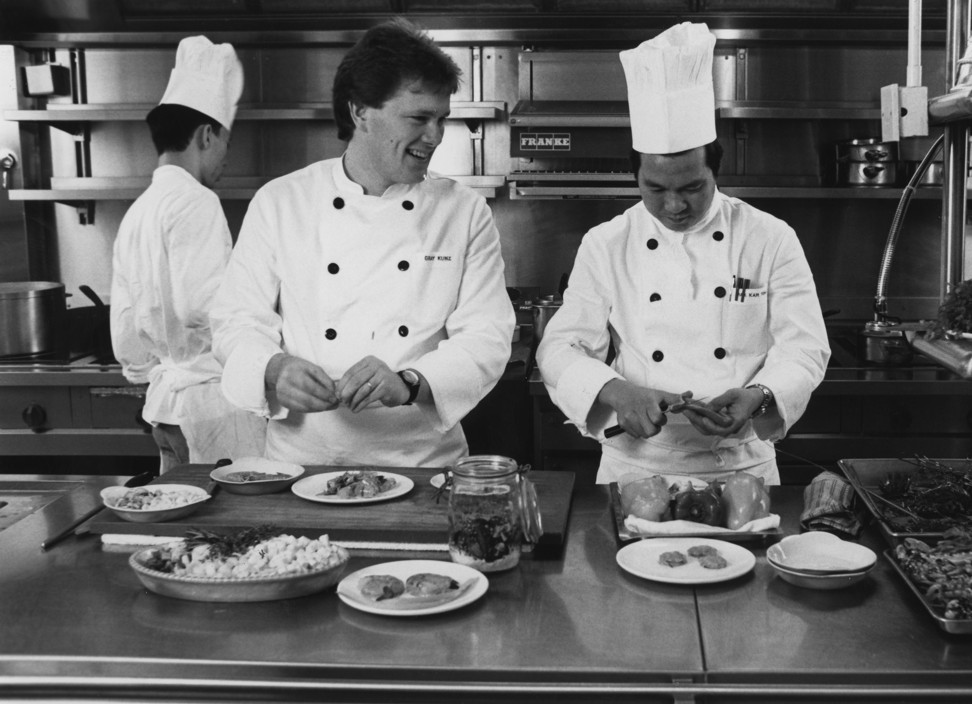
“The New Year’s dinner was a big deal and the second or third year I was there, I was crazy enough to talk to one of the fishermen I know and said I want to serve green wrasse fish. I remember the guy’s face when I said I need 300 portions. He thought, ‘This gweilo is certified crazy.’
“But over the year, whenever he caught them, he would put them in pens in the water. Then they brought them into the hotel in big barrels with bubbling water and everyone stopped to watch. That fisherman was so proud to be able to collect enough fish.”
You designed your own spoon! Why is it so special? “The first time I saw it was at chef Girardet’s place and I was able to find the Italian manufacturer. We tweaked it so that the weight tips forward when you have it in your hand. It turned out to be a huge success – 28,000 were sold last year. I’m going to do a knife, fork and tweezers. Maybe I should create the first high-end non-breakable plate in the world [laughs].”
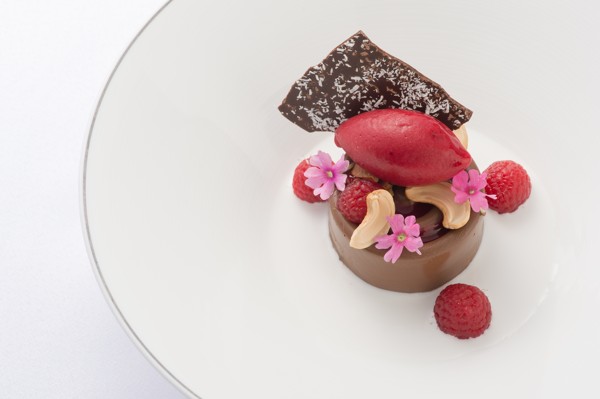
“But once I take off, there’s no phone, I talk to the pilots, airports, towers. Then you focus on staying alive. It’s pretty serious stuff but it’s a sense of accomplishment. Afterwards I’m exhausted but my mind is so clear. After that I can do a full day of work.”
Where do you eat in Hong Kong? “I love to hang around dai pai dongs. I like how they focus on one thing and do it perfectly, which is the proper way to go. I go to Sham Shui Po and Sheung Wan the most, and the Wan Chai market. I like the stalls outside. I like simple broths with vegetables and noodles.”
Do you take care of yourself? “When I’m here I wake up around 5.30am and walk along Bowen Road. I get a kick out of it, plus it’s a good workout. I like to be here [at Café Gray Deluxe] around 8am. I want to stay healthy – but these trips are very demanding.
“I recently went to a fitness camp in San Diego [in the United States] and spent 2½ weeks there. They had a psychologist, doctor, naturalist, herbalist and botanist. They drew blood and found I had copper, iron and calcium deficiencies. It was an awakening for me.
“If you want to do my profession well, it demands huge intellectual and physical presence. You’re dealing with hot and cold, knives, all that stuff and you have to have a clear head, with a clean lifestyle. I’m 62 but I feel like I’m 30. This kind of energy you cannot fake. I feel fortunate and blessed.”

